Raptor easily blows through 14-inch snowstorm
Filed under: Weekly test drives, Autos
By John Gilbert
Opinions mean everything when you’re evaluating vehicles, and that’s OK, and long as those opinions are come by with honest objectivity. And, as long as you’re flexible enougb to change your opinion. You could say I prefer most cars to most trucks, and I prefer most blue paint jobs to most red, yellow or any other.
And then, at the height (depth?) of this winter’s heaviest cold and snow season in Duluth, Minnesota, I had the chance to test a new Ford Raptor pickup. The Raptor identity came on the full-size F150, and even though Ford is branching out with the popular stability and handling variations of the Raptor on other vehicles including the Ranger and the Bronco, this one was the newest versin of the vintage F150 full-sized vehicle.
It arrived on a nice, calm winter day to our home up the hill from the North Shore of Lake Superior, but it didn’t stay nice or calm for long. As the wind carrie the storm out over the Big Lake, then circled back to hit and rehit our area, we wound up with an overnight snowfall of 14 inches. Then the temperature dropped below zero, as if to torment us because the snow itself was pretty light and fluffy, and we weren’t destined to have it easy.
I hadn’t really had the chance to drive the Raptor the first day, but the chance — and some pretty convincing evidence on its behalf — came on Day 2, when the true benefit of a full-size pickup truck hit me right between the eyes.
The evidence started piling up, you should pardon the expression, when I first climbed up into the Code Orange Ford Raptor. The color alone made the Raptor graphics stand out, and the truck is tall enough to stand out above the deepening snow in our driveway.
But for once, I had a cavalier attitude about the snow. I just didn’t care, because I knew this F150 Raptor was raised, widened, and had beefed-up suspension to take on any task on or off road. Or in knee-deep snow.
It was an easy step up, out of the fluffy white snow and onto the fixed cast-aluminum running board, while vaulting hips-first into the very stark and very wide, interior of Ford’s hottest performance pickup. Looking ahead up my 100-yard driveway I could see the 3-foot high ridge of snow left by the county plow guy, I still didn’t care, although my adrenaline started to rise at the obvious challenge, as I pushed the right button to bring the 3.5-liter twin-turbocharged V6 roaring instantly to meaningful-sounding life.
Instantly, the image came to mind of the Raptor saying, “This? This is nothing!” as it snarled to life in the 10-below temperature. I gave it a minute while I checked out all the controls. Then I shifted to “D” and away we went, breaking our own new trail through the snow and whumping through the plow’s pile to blast onto our rural roadway. It’s hard to believe the Raptor began life as a Ford F-150 before getting the Raptor treatment of a widened platform and all sorts of beefed-up, oversized suspension, exhaust, engine, transmission, ground clearance and other alterations to make it better suited to conquer the worst off-road conditions.
In Duluth, Minnesota, the definition of bad conditions needn’t be just off-roading fun, because it can also mean treacherous driving to and on roadways because of large snowfalls that seem to be particularly common this winter of 2021-22.
That’s why the revelation hit me. Yes, I like cars in most instances over the huge array of trucks and SUVs, but when you think about it, when five months of your year might face a dozen criticial wintry threats, having a truck makes a lot more sense than for city-dwellers who just “want” a truck. And if you’re getting a truck, you might want the industry’s standard killer truck for all purposes. And if that means you choose the Ford Raptor, then why not also get it in Code Orange, a bright, flashy paint scheme that is peppered with black decal styling items that indicate to all the world that your super truck is, indeed, a Raptor.
With specific running lights on the top edge of the big grille, with the huge letters “F-O-R-D” covering the full width, there’s no chance anybody will mistake what’s coming at them. Also, if somebody crashed into the Code Orange Raptor, they’d have to be trying to. No failure to see this beast approaching could be called accidental..
So many “locals” have big pickups that are justified by a tendency to tow a boat or snowmobile trailer up to the cabin, nobody questions the decision. Among all the adjustments possible is a mode switch to set at Normal, Sport, Baja and Quiet. If you suffer from an overdose of macho, going from sport to Baja focuses everything including the exhaust to declare your intentions, and if you have no macho tendencies, I guess you could select normal, but I’m not sure that anybody worth the $78,545 sticker price would click it into quiet.
It is interesting that Ford chose to build a new platform and arm the newest version of the Raptor with enormous off-road tires and a specially-designed Fox Shock absorber system to help showcase the new five-link coil rear suspension and long rear coil springs to all help getting the bolstered power delivery from an estimated 450 horsepower and 510 foot-pounds of torque to the ground, whether it be street or rocky terrain.
Part of the improvements at every part of the Raptor has to be the challenge from the Ram TRX, a new rival to Raptor’s domain. But what is most impressive about the Raptor’s obvious off-road capabilities are that they don’t turn the Raptor into a heavy-duty pogo-stick on rough streets.
We found the seats very comfortable and supportive, but driving over weather-battered streets and construction zones never caused any harshness or discomfort, and we would have to say the new Raptor is over-built for normal trips to Target or the grocery store. Comfort, meanwhile, is everywhere for five occupants in the Super Crew 4×4 — the only version of the F-150 that can become a Raptor. Such features as a potent audio and a large information screen on the dash lead to the logical inclusion of all the connectivity and media features, as well as controls for the requisite camera views for parking and maneuvering aid.
For those who do work from their trucks, the Raptor has Ford’s trick console, with a fold-down shift lever, and a flip-over lid that turns into a desk, and reveals a deep, cavernous bin for hanging files to organize your next construction job. With all that, the Raptor is maneuverable and easy to handle, even in congestion where the wider body might seem a problem.
Rumors persist that Ford is already planning for increased challenges, starting with building a Raptor version of the Ranger, and next supplying the new Maverick compact truck with a Raptor model, as well as the new Bronco, which has a half-dozen different models, so why not a Bronco Raptor? But the F-150 Raptor may be about to add a V8 just in case Ram or anybody else tries to outdo the current Raptor’s power.
Me? The 3.5-liter twin turbo V6 is more than adequate, and it works well with the 10-speed automatic, and all those trick suspension pieces that help lift the beast higher than its ground clearance can handle. That would be a lot, because it currently has 14 inches of front travel and 15 inches in the rear.
That’s plenty for conquering the biggest off-road challenge you might be able to locate.
And for sure, it makes a foot-deep snowfall or a waist-deep snowplow ridge no challenge at all.
Chicago Auto Show renews hope in EVs, cars
Filed under: Weekly test drives, Features, Autos
By John Gilbert
CHICAGO, Ill.
There may be a better site for a revival than McCormick Place in Chicago, but it’s hard to think of a bigger one, particularly if it’s a revival of the nation’s auto show culture, which is showing signs of returning to normalcy with the currently running Chicago Auto Show, which will continue through this weekend and ends on February 21.
Auto shows took a beating, as did everything in this country, if not the world, and the common conjecture was that we may have seen the last of the major gatherings of the newest vehicles from all over the world in one large facility. Manufacturers have continued to overcome parts shortages and shipping woes and have moved onward and upward to meet the demands of a new world order, and the Chicago show is an example of our future driving concepts might shape up.
Perhaps the most significant change in tendencies is to move onward and upward from our consuming passion for all things SUV, and perhaps take a serious look at electric-powered vehicles. In Minnesota, major dealership spokesmen have tried to throw cold water on suggestions that automobiles might be shifting away from internal combustion powertrain toward electric motor operation. When you look into those dealer claims, however, you find that all of them are making huge profits selling big trucks and SUVs, and would just as soon leave the status quo where it stands.
But if you get the chance to visit the Chicago Auto Show — which happens to be the oldest and largest-attended of the major U.S. shows that also include Los Angeles, Detroit and New York — you will find large gatherings at virtually every stand as consumers try to get closer looks and more information about the futuristic-looking array of EVs.
But you’d better hurry. A quick flight or drive to Chicago for a weekend walk around at McCormick Place can be done in a day, but only through President’s day on Monday, then it will close up shop. As it is, we might call this year’s show “Chicago Auto Show Light,” because some manufacturers have stayed away, possibly worried that the COVID-19 pandemic could knock out another round of the auto show circuit.
All-electric cars dominate the South Exhibition Hall of McCormick Place, where along with looking closely at the vehicles on display, you might get in line for a short on-site run around the short cone-lined course laid out on the paved floor. The Kia EV6, the BMW iXM60 flagship, and various other EVs did more than just show off all angles of their vehicles.
Kia and its South Korean partner and benefactor Hyundai both displayed numerous hybrids and EVs. At the Kia display, you could examine the basic chassis, exposed with its full-width battery pack that fills the whole lower area of the floorpan between the axles. Hyundai, Kia’s South Korean partner, has the same drivetrain in its new 2022 Ioniq5 models. Their drivetrains have a range of between 270-300 miles, and will recharge a large percentage of it in 15-20 minutes.
Nearly every manufacturer has their latest electric vehicle on display, and some have cars on the mini-track to offer examples of what driving an electric car will be like, for those who haven’t had the experience yet of the swiftness and silence.
The show kicked off with media preview days on February 10-11, leading into the show, which runs through Monday, February 21. One of the luxuries is that you can get a room at the connecting McCormick Place Hyatt, which means you can walk from your room to the arena itself without going outside into what is predictably a cold, harsh and windy experience.
A number of prominent companies — Mercedes, Audi, Honda, Acura, Infiniti, Cadillac, Genesis, Porsche, Mazda, and Tesla, for example — were nowhere to be seen. Those who did put up displays were very limited in the presentations they offered. Curiously, several companies generously gave out the very neat little carrying bags into which you can stash dozens of press brochures you acquire on your rounds of a typical show, but Hyundai was the only one that offered an actual brochure to show off its many impressive new models.
Of course, the move to electric is arriving in a glancing blow from the popularity of hybrid powertrains, which run a little bit on electric and have gas engines to keep the power on while also recharging your battery pack, resulting in unusually high fuel economy.
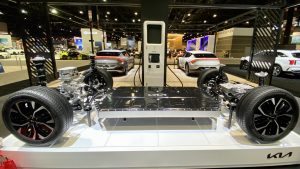
The LG Chem battery pack fits low and wide between the axles of Kia’s EV6, delivers nearly 300 miles of range and can recharge swiftly during a lunch stop.
The term “range anxiety” refers to the worry that your electric car might run out of juice before you get to either your destination or home — or at least a charging station where you can replenish its batteries. An ever-increasing number of battery companies and electric utilities are expanding almost by the week to place more and more charging and high-speed charging stations up, all around the country.
Here is a brief rundown of the new cars on display at Chicago’s show:
The new Corvette Z06 — the first Corvette with an engine lacking pushrods! It has a high-tech dual-overhead-cam, 5.5-liter V8 with 870 horsepower in the mid-engine machine. It is right next to Ford’s display with its original GT40 LeMans race car on a stand adjacent to the newest, and reportedly final, new Ford GT that looks like the old one grown up, with its mid-engine powertrain.
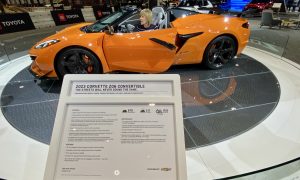
Historically a pushrod stalwart, the 2023 Corvette Z-06 will get a high-tech, DOHC 5.5-liter V8 with 870 mid-engined horsepower.
Of course, both Chevy and Ford have their latest offerings, and both have pure-electric full-size pickups on hand. Other eye-catchers are Lexus, with expanded versions of its flashy LC500 coupe and convertible. But after that, and the assorted Volkswagen Golf R and Arteon, plus new compact SUV fleet that includes the Taos, Hyundai and Kia were among the few stressing cars.
The focus on trucks has not diminished, of course. Ram held a presentation for its special-service debut of the fire department first-responder red pickup; Chevy showed off its new Silverado, which now includes a new electric version; Toyota displayed its new Tundra and Tacoma, and large SUV 2023 Sequoia and had a meaningful presentation; GMC had a display mounted by a white Hummer EV, with a bed in back; Jeep showed off a variety of Grand Cherokees and the new Grand Wagoneer; Hyundai had its new Santa Cruz and Tucson; sKia its new Sportage’ and Ford, as usual, took the truck lead. Along with its array of F-150s, Ford showed its hybrid and its electric Lightning, and its hard-to-get Maverick with hybrid power. Its feature though was the difficult to get Bronco Sport in Raptor trim — bright orange, on a pretend rocky peak with its doors removed, presumably ready to take on Jeep’s best. Along with the widened and toughened Raptor Bronco Sport, Ford unveiled the new Bronco Everglade — a well-trimmed model with a winch in front, and the ability to drive through water 34.6 inches deep, probably in pursuit of alligators. Kia also presented a display with the new EV9, but that overlaps into our electric category.
The rush toward EV (electric vehicles) may not have taken over yet, but the momentum is building, and virtually every week you hear about new high-speed charging locations as they spread across the country. BMW, for example, is offering free charging for the first two years you own your BMW EV. We know Mercedes and Audi have a lot going on in EVs, so they were spotting BMW a stronghold by not appearing.
For pure EVs, the list shows: Volkswagen’s iD.4 and Golf e; Mustang had a couple Mustang Mach e models; the aforementioned Hyundai Ioniq5 and compact Kona EV, plus its all-new Tucson, rivaling Kia, which showed the EV6 and the Niro EVs amid several hybrid and plug-in hybrid models, and had a concept EV9 for those needing more room; Nissan displayed its new Ariya EV, Toyota had a Rhombus concept vehicle and its new bZ4X sporty car, and Subaru had a very impressive display featuring newly enlarged models and a new Solterra EV. Those are just some of the newest EVs ready to hit the market.
Hopefully, some of them will overcome the publicized resentment some dealers have shown toward Gov. Tim Walz, who had the wherewithal to adopt the California emission laws that will push for more more timely switchovers to electric power. In that case, more
may come up to the Minneapolis show, which is basically a regional dealership presentation. Otherwise, you can hurry and get to Chicago in time to catch the final days of the Chicago Auto Show.
We’ll get to test most if not all of the newest models in upcoming weeks and months, but for now, pictures can be better than words.
Outlander proves Mitsubishi is alive and well
Filed under: Weekly test drives, Autos, Uncategorized
By John Gilbert
It seemed like it took most of a year before I got a chance to test drive a 2022 Mitsubishi Outlander SUV, and it was as much a relief to get one from Mitsubishi’s Midwest test fleet as it was to drive the midsize vehicle with what to me is a familiar name.
The Outlander has been completely redesigned, with a new platform and new engine and interior, to go along with the smaller Outlander Sport, and the even more-compact Eclipse Cross. I had feared that Mitsubishi might decide to quit marketing its vehicles in the U.S. because of the stiff competition worldwide.
I am pleased to see a resurgence in Mitsubishi vehicles. When I started analyzing and writing about new cars back in the late 1960s, it was an exciting crossroads of the industry, with some awkward and outdated American cars indignantly trying to hold off the arrival of high-mileage and high-tech imports from Japan.
Honda, Toyota, Nissan, Mazda and Subaru were trying to find their way into the U.S. market. So was a very impressive conglomerate known as Mitsubishi, made an arbitrary decision to go with Chrysler Corporation to produce some of its subcompacts like the Dodge Colt, and an amazingly durable and dependable 3.0-liter V6 that Chrysler put into various cars such as their Caravan and Voyager minivans. Those minivans were about to take over the family marketplace, and those bullet-proof engines were a big reason for their success. We have friends who put well over 200,000 on them, then gave them to their kids for another 100,000 economical miles.
Mitsubishi also built a subcompact, known as the Mirage, which in the U.S. became Dodge Colts and Plymouth Champs. They were fun and quick, and delivered over 40 miles per gallon, while the minivans were proving bulletproof.
I road-raced a Dodge Colt in the Sports Car Club of America’s new Showroom Stock category for that summer of 1970, using a Colt set up by White Bear Dodge for amateur competition. I learned a lot about road-racing when I battled a veteran driver and beat him for second place in a timed race around Donnybrooke Speedway’s 3-mile course, after which I was flattered to get the award for fastest race lap. Only then did it occur to me that if I turned the fastest lap, why was I fighting for socond instead of first?
I was impressed enough with Mitsubishi’s engineering that we bought a Colt station wagon for our young family, and later a Colt hatchback, on which y0u could screech the tires in the first three gears and still get 43 miles per gallon. As years passed, I also learned that Mitsubishi built the best electronics in the industry through its MGA televisions, tuners and speaker systems, and we enlisted in them, too.
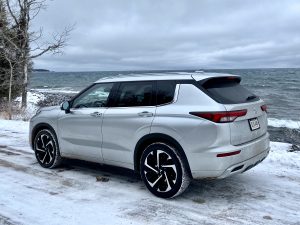
Outlander is reinforced as the iconic top model for Mitsubishi, with even a tight third row of seats.
The arrangement dissolved as Chrysler wound up being bounced around by various investor-owners, and stand-alone Mitsubishi dealerships faded and disappeared from a lot of cities, including Duluth, Minnesota, where we now live, and where a thriving dealership was eliminated and consumers had to search the Twin Cities to find a Mitsubishi dealership.
So the 2022 Outlander carries Mitsubishi’s hopes of expanding its reach in the U.S.,, and reports have been positive. Our test Outlander carried a sticker price of $35,295, which puts it right among its competition, although the Outlander was filled with feature options.
The similarity of cars and SUVs these days is such that many of them look alike, and to stand out means to incorporate some unusual styling. The Outlander has done just that, with a prominent grille outlined at the top by sleek, thin LED lights, which curve artfully around to outline the upper grille and descend to also isolate the small blocks of LED lights on either side of the lower grille. The lights themselves are outstanding, as well as certainly distinctive.
Surprisingly, for such a blunt compact, there is actually a third row seat, which must have required a masterstroke of engineering just to wedge it in back there. We never folded the seat up, choosing to leave it down in case we had a large supply of groceries. Maybe that’s perfect, because if you need to seat seven, two or them will have to be small children, who would love to have their own kid-size seats.
As the old saying goes, better to have it and not need it than to need it and not have it.
From the side, or rear, the Outlander’s graceful lines are more conventional, which is fine because its identity is in its face. Inside, the white quilted leather seats are encapsulating, and the shifter meets what seems to have become an obligatory complexity in simply moving your choice from park to drive or neutral or reverse. In the Outlander, it is less obtrusive and you learn to rock your finger fore or aft to find your desired gear. There is a large information screen mounted nice and high in the center of the dash, and you can find more information than an ordinary driver can want.
Under the hood, Mitsubishi has installed its new 4-cylinder engine, measuring 2.5 liters in displacement with a nicely balanced 181 horsepower and identical figure for torque, which collaborate to make the Outlander quick enough and sporty enough for a family hauler. It is annoying to try to find a CVT (continuously variable transmission) that is anything but boring, but in the Outlander, large paddles on either side of the steering wheel allow you to shift through eight stops on the CVT, and if you use the paddles adroitly, you can forget you even have a CVT in the thing.
Some have accused the Outlander of leaning too far on turns, but I found it just right — better than an overstuffed vehicle but tastefully short of being racy. The EPA estimates show 24 miles per gallon city and 30 in highway driving, and we got 32 or 33 on combined but mostly city driving. Our gauge showed 32.6, for example.
It’s also evident that Mitsubishi is heading toward hybrid and electric power, and I await any plans that may be coming.
Mitsubishi maintains the tradition of offering something beyond the normal technology, and an example might be that instead of just calling it “all-wheel-drive,” the Outlander’s system is called “Super All-Wheel Control.” There are some creative ways of executing, with adjustments for setting your drive mode.
We did some experimenting on some hard ice to see exactly what difference the change in modes might make. With my son, Jack, standing outside the car to observe me on a slab of ice, I tried accelerating hard in normal, and in the slippery setting. In normal, all four wheels spun immediately in chorus; in slippery, the front wheels spun for a couple revolutions, and after a momentary delay the rear ones started to spin, too.
In overview, the new Outlander lives up to its redesign scheme by looking unique, and it lives up to Mitsubishi’s reputation of adding a few new wrinkle to the drivetrain and shifting process. It passes all the tests for comfort and economic efficiency as well, and its audio system is as good as anticipated.
For me, of course, it’s also a tremendous benefit just to know Mitsubishi is still selling vehicles in the U.S. and its positive sales since the Outlander’s redesign mean good things for the future.
Bronco versatility includes 2-door, stick shift
Filed under: Weekly test drives, Autos, Uncategorized
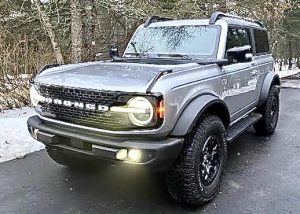
Larger than the Bronco Sport, the “regular” Bronco is roomier, more rugged, and has a 2-door version.
By John Gilbert
Auto companies can baffle us with the manipulation of introductions, and the most recent example is the highly popular Ford Bronco, which revives the name of the company’s original SUV workhorse, loaded up with modern technology. If I didn’t know better, I might have thought Ford created more questions than it answered when it brought out a string of the versatile and useful Bronco, although I enjoyed all the different versions I drove.
How could you not enjoy the Bronco Sport, a tight little 4-door SUV capable of handling all your objectives for family SUV duties or light off-roading? And then I got a second one, also a Bronco Sport, and also fun to operate. And later still, I got one with a stick shift that was a bit more work/off-road oriented, with a slick-shifting 7-speed manual. After all that, I got the bigger Bronco, not the Bronco Sport, and in 2-door fashion.
I knew that Ford also was bringing out a larger Bronco a bit later than the Bronco Sport, with more interior room, and the ability to haul more people and stuff. So about the time I figured out the 4-door Bronco, I got a couple different 2-door models, and they also were fun to drive, and felt sportier.
If you aren’t slightly confused by now, maybe you haven’t been paying close attention. I eagerly hopped into the most recent Bronco, realizing immediately something was different. That was because it was a 2-door, after all the earlier ones of both were 4-doors.
The 4-door is well made and takes care of business efficiently. But, c’mon — don’t we all harbor secret fantasies about having a 2-door SUV? I know I have.
The first 2-door model I had was the stick shift! Ford has equipped some Broncos with a 7-speed stick, and that gives you the ability to keep it right where you want it no matter what your intentions are. Fortunately, the second one I got came equipped with the 10-speed automatic, a smooth-shifting unit that is perfectly set up for the equipment at hand and offered a comparison.
The Bronco 2-door Advanced 4X4 was the “Black Diamond” model and felt light and quick, and came with a 2.3-liter EcoBoost twin turbocharged 4-cylinder engine. The stick was remarkably smooth to shift and accelerated out of trouble with ease. It has 275 horsepower and 315 foot-pounds of torque.
The hill-start assist is a neat feature, with a stick, because it puts you at ease when you stop on a hill, sure that the vehicle won’t start rolling backward while you’re heel-and-toeing at a stoplight short of the crest.
That’s particularly handy if you’ve gotten a little rusty in your heel-and-toe skills with a stick and a clutch. It also had what Ford calls “full vehicle steel bash plates.”
The 2-door gives you a spacious rear seat, although getting into it requires some agility.
The Black Diamond trim is neat and gives you some dded features, including an optional removable roof. Ford wants the Bronco to tackle the same off-road projects as the Jeep Wrangler, so it starts out by making it available with doors that pop off, in addition to the roof, so you can go cavorting around doorless and topless, if that suits you. Also in the concept of stripping it down for hardy use, the side mirrors come affixed to the frame itself, rather than on the door, which always seems to cause more vibration and need for adjustment. No adjustment needed, in this case, even if the doors are back home in the garage.
The Bronco 2-door with the 10-speed automatic was equipped with the Wildtrak package, which means, in my tester’s case, a 2.7-liter EcoBoost V6, with lots of excessive power, compared to the 2.3-liter 4. The V6 lists 315 horsepower and 410 foot-pounds of torque, at a sticker price of $53,650.
Curiously, the larger engine with the automatic didn’t feel as quick as the four with the stick.
One of the features that attracts folks to the Bronco is the array of gadgets that make it seem like a good deal, such as the cargo area protectors, the black roof rails, and the neat LED headlights that shine in a tight pattern even though appeareing to be squinting just a bit. The heavy duty floormats can be hosed off for cleaning if your off-roading includes acquiring a bit of mud inside and out.
When I first saw the array of Broncos, I wasn’t sure where I stood. But the stick-shift 2.3-liter version lists for $42,720, as equipped, while the 2.7 V6 model lists for $53,650. Both have distinct personalities, after you realize there are some differences.
The smaller Bronco Sport, with four doors, makes any selection a tough choice. Among the impressive advancements in modern cars is that some of the new 4s perform right up there with the usual V6es, and some of the new automatics seem to work as efficiently as the best stick shifts. Such modern automatics work so smoothly that they can relegate the stick shifts to the discard pile. Unless, that is, you like stick shifts as much as I do.
In the case of the Bronco family, the stick can make the 4-cylinder feel quicker and deliver better fuel economy than the V6. In that manner, the stick makes the 4-cylinder function like old-time off-roaders, even ones originally called Broncos.
That is especially so if you take the doors off and let it all hang out, so to speak.
4Runner adds loaded TRD Sport
Filed under: Weekly test drives, Autos
By John Gilbert
For nearly 40 years, Toyota has been building a midsize SUV known to the world as the 4Runner. Great name, because while it may not have been as all-out off-road-capable as the Jeep, its name alone means it is verifiably “the” 4Runner.
Every manufacturer of SUVs wants to take a shot at the Jeep’s incredible off-road heritage, even those that do a reasonable job of but light off-roading, fall far short of those Wranglers and other members of the Jeep family. But the 4Runner is different, and the 2022 version of the 4Runner — part of the fifth generation — lets its performance and reputation carry it beyond where mere public relations might go.
If you talk to a Toyota dealer, you might get its salesmen to agree with you that there isn’t a great deal of new stuff on the 4Runner. But ask him which vehicle is in the greatest demand among all things Toyota, and he might say the 4Runner. And in the same breath, if he knows his business, he might tell you the 4Runner will climb mountains and challenge any terrain the Jeep Wrangler will take on, and not finish second.
We can’t verify that, but the new 4Runner is impressively equipped for rugged duty and it is designed to stand the test of time, and it is not just another body-on-frame truck. The other fact in 4Runner’s favor is that while the new models may seem expensive, they hold their value so well that demand for two or three year old 4Runners is off the scale. A Toyota salesman I know said buyers seeking recent-year used 4Runners is right up there with the Tacoma midsize pickups on which it is based, and the full-size Tundra pickups.
The new 4Runner now can offer seating for seven, and it comes in over a half-dozen varieties. The model I test drove was the “TRD Sport,” a newcomer to the family.
If you list the 4Runners, you start with the SR5, SR5 Premium, TRD Off-Road, TRD Off-Road Premium, and the Limited Pro, and the Special Edition. That’s six, and adding the TRD Sport borrows from some of its siblings in expanding the brand to provide pretty much the specific vehicle anyone might want.
The TRD Off-Road is the most rugged, probably, and it has seriously upgraded suspension and suspension, with the Premium version getting the cross-pattern adjustable suspension, which adjusts the suspension in a cross pattern — left front-right rear or right front-left rear — to offer better cornering and off-road stability. The TRD Off-Road Premium has that, and that alone gives the new TRD Sport something beyond the scoops and specialty logos and badges and special seat surfaces to justify its price tag of the tester’s $48,199.
Painted “Magnetic Gray,” the TRD Sport has a base price of $44,620, and adding in such things as th kinetic dynamic suspension system, running boards and the moonroof jacks the price.
As seems to be the case in virtually all new vehicles these days, less is said about the powertrain, which used to be the main focal point of promotion. In the 4Runner, you get Toyota’s 4.0-liter V6, which delivers 270 horsepower, and 278 foot-pounds of torque, which is certainly enough to climb your neighborhood avenue, if not cliff. And it also will tow a maximum of 5,000 pounds.
Transmission is a 5-speed automatic, operable with paddles for manual control, and with a part-time 4-wheel-drive system and Toyota’s ActivTRAC, it seems as though five gears are enough, since you can double them by shifting back and forth from 2-wheel to 4-wheel drive, and choose high or low ranges.
We found that we pretty well matched the EPA fuel economy figures of 16 city and 19 highway miles per gallon, which is OK for a rugged vehicle that has such consumer-aided assets, although a lot of competitors will get from 25 miles per gallon and upward toward 30. Maybe it’s just a matter of time until Toyota bolts one of its hybrid systems into it.
If Toyota has been subtle about toughening the 4Runner for all off-road capabilities, now it is just as subtle about sophisticating the whole package to work more smoothly and be more civilized on normal roads. Those are the assets the refinements make on the TRD Sport, and the comfort inside is evidence that it works. The seats are covered with SofTex, which is some sort of bullet-proof material that is pleasing to the touch and obviously rugged.
It was just a matter of luck that in the week I had the 4Runner TRD Sport, my Duluth-area was hit by a pretty healthy snowstorm, which meant I could fiddle around with the settings and churn through the plow-left snow-piles with ease.
If you are a serious off-roader, this TRD Sport would work well, and if you’re not into off-roading, you can actually enjoy spending your winter months taking on blizzards and foul-weather conditions. It is also fascinating to observe the new Jeep Grand Cherokee go from being off-road tough to on-road sophisticated, but even there, the Toyota 4Runner TRD Sport gives that brand an equal competitive stance either on or off the road.


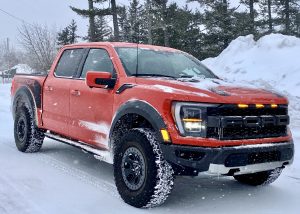
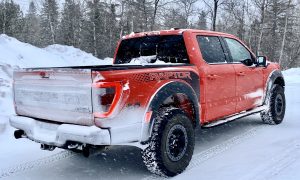
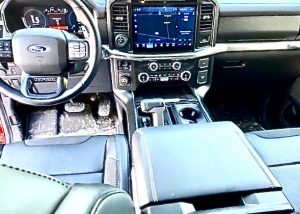
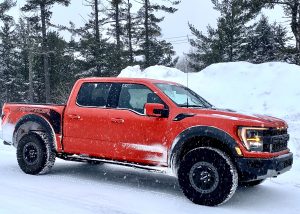
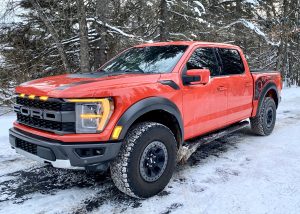
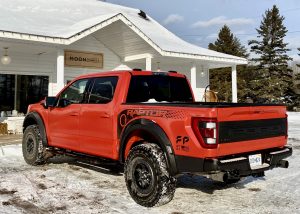
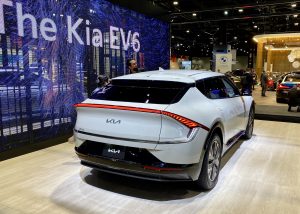

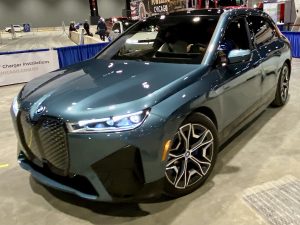
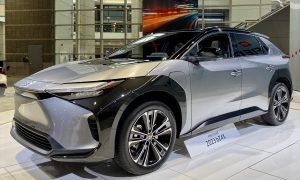
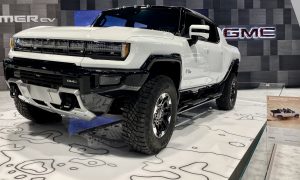
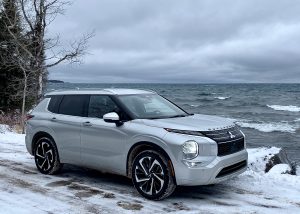
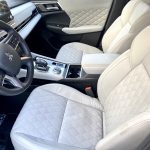
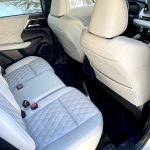
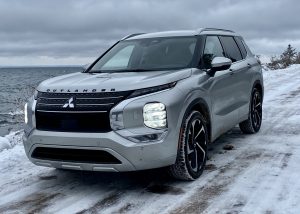
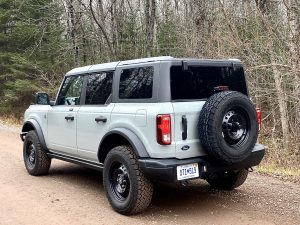
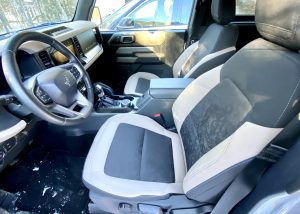
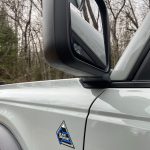
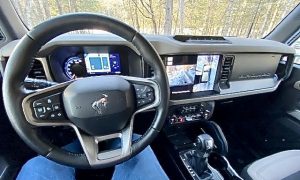
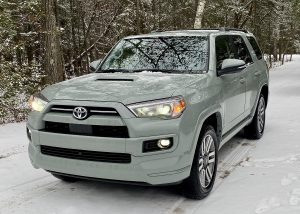
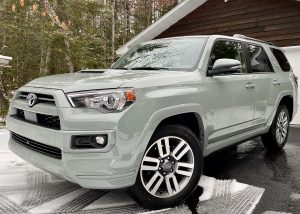
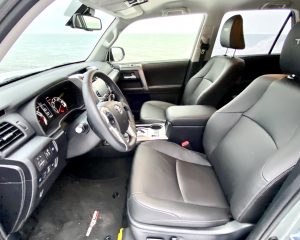
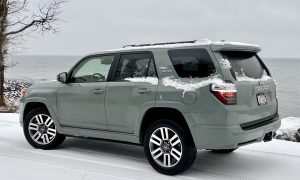
 John Gilbert is a lifetime Minnesotan and career journalist, specializing in cars and sports during and since spending 30 years at the Minneapolis Tribune, now the Star Tribune. More recently, he has continued translating the high-tech world of autos and sharing his passionate insights as a freelance writer/photographer/broadcaster. A member of the prestigious North American Car and Truck of the Year jury since 1993. John can be heard Monday-Friday from 9-11am on 610 KDAL(www.kdal610.com) on the "John Gilbert Show," and writes a column in the Duluth Reader.
John Gilbert is a lifetime Minnesotan and career journalist, specializing in cars and sports during and since spending 30 years at the Minneapolis Tribune, now the Star Tribune. More recently, he has continued translating the high-tech world of autos and sharing his passionate insights as a freelance writer/photographer/broadcaster. A member of the prestigious North American Car and Truck of the Year jury since 1993. John can be heard Monday-Friday from 9-11am on 610 KDAL(www.kdal610.com) on the "John Gilbert Show," and writes a column in the Duluth Reader.